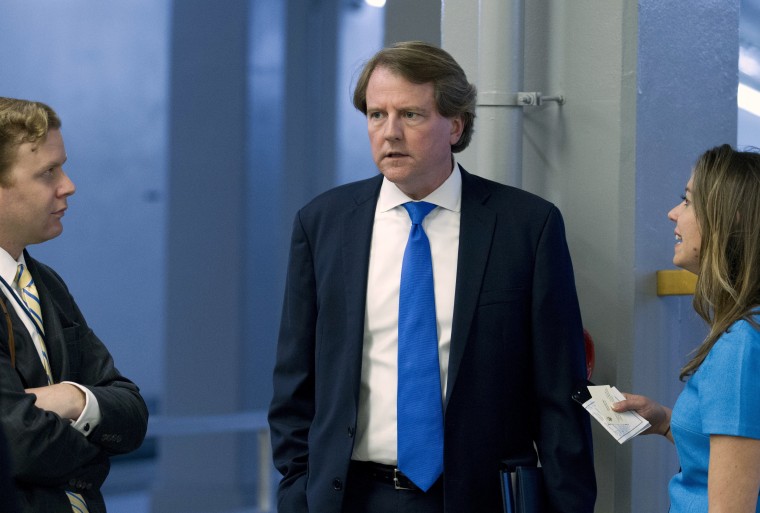Donald Trump acknowledged over the weekend that former White House counsel Don McGahn has received a congressional subpoena, but the president suggested he'd block the testimony anyway. "I would say it's done," Trump told Fox News.
Pointing to McGahn's cooperation with Special Counsel Robert Mueller's team, the president said, "I've had him testifying already for 30 hours." The president added, in a difficult-to-understand sentence, "I don't think I can let him and then tell everybody else you can because especially him because he was the counsel."
Today, the White House followed through on this point.
The White House has directed former counsel Donald McGahn not to comply with a congressional subpoena for documents related to special counsel Robert Mueller's investigation, current White House counsel Pat Cipollone said in a letter Tuesday.McGahn was subpoenaed last month by House Judiciary Committee Chairman Jerrold Nadler, D-N.Y., for testimony and documents as part the panel's investigation into possible obstruction of justice by the president and others.But in a letter to Nadler Tuesday, Cipollone wrote that the subpoena seeks "certain White House records provided" to McGahn when he was White House counsel. Those documents "remain legally protected from disclosure under longstanding constitutional principles, because they implicate significant Executive Branch confidentiality interests and executive privilege," Cipollone said, adding that McGahn "does not have the legal right to disclose these documents."
We're dealing with a political landscape in which White House stonewalling has become the norm, as officials effectively declare war on congressional oversight. But as Rachel explained on the show last night, the McGahn case is of particular interest, in part because Team Trump's argument against cooperation is so weak.
There are two main angles to this: the testimony and the documents. Let's take them one at a time.
On the former, McGahn is a witness of particular significance: few figures play as an important a role in the Mueller report as the former White House counsel. As we've discussed -- and as Trump has acknowledged -- the Republican lawyer spoke with investigators for dozens of hours, and in the redacted version of Mueller's report, the former White House counsel is cited more than 150 times.
In some of the episodes in which Trump allegedly obstructed justice, the claims of suspected criminal misconduct are based heavily on what McGahn told investigators.
Indeed, as the special counsel's findings made clear, the former White House counsel very nearly resigned because the president directed him to "do crazy s**t," including an incident in which, according to McGahn, Trump pressed the lawyer to push the Justice department to derail the investigation by getting rid of Mueller and creating a false document to cover that up.
Not surprisingly, Democratic lawmakers have a few questions about McGahn's controversial interactions with his former boss. Trump wants to block those conversations, claiming executive privilege, though it's almost certainly too late for that. The president already waived privilege when he allowed McGahn to testify to the Mueller. (It doesn't help that Trump has also already spoken publicly about the conversations he and McGahn had behind the scenes.)
As for the documents, the House Judiciary Committee asked the former White House counsel for an expansive list of materials -- Rachel highlighted some of the areas of committee interest last night, and they're pretty dramatic -- none of which Team Trump is prepared to share, subpoena be damned.
What happens now is far from clear. Will there be a difference between how testimony and document production are handled? Will there be negotiations between the branches? Will all of this be tested in the courts?
Watch this space.
